PSYCHOLOGY 401005: Psychosocial Development and Life Transitions Essay
VerifiedAdded on 2022/11/09
|6
|1538
|277
Essay
AI Summary
This essay delves into the realm of psychosocial development in children, specifically focusing on the crucial stage of two to five years old. It meticulously explores the significance of toilet training and the pivotal role of parenting in shaping a child's psychological and social well-being. The essay elucidates how successful toilet training fosters autonomy and confidence, while effective parenting instills trust and a sense of security. Conversely, it highlights the potential negative consequences of unsuccessful toilet training and inadequate parental care. Furthermore, the essay examines various factors that influence psychosocial development, including the environment, false-self training, and disability, alongside the impact of poverty. The discussion emphasizes the importance of nurses understanding psychosocial development to effectively support children and their caregivers. The essay concludes by reiterating the significance of addressing potential negative influences on psychosocial development to ensure children's healthy and confident growth.
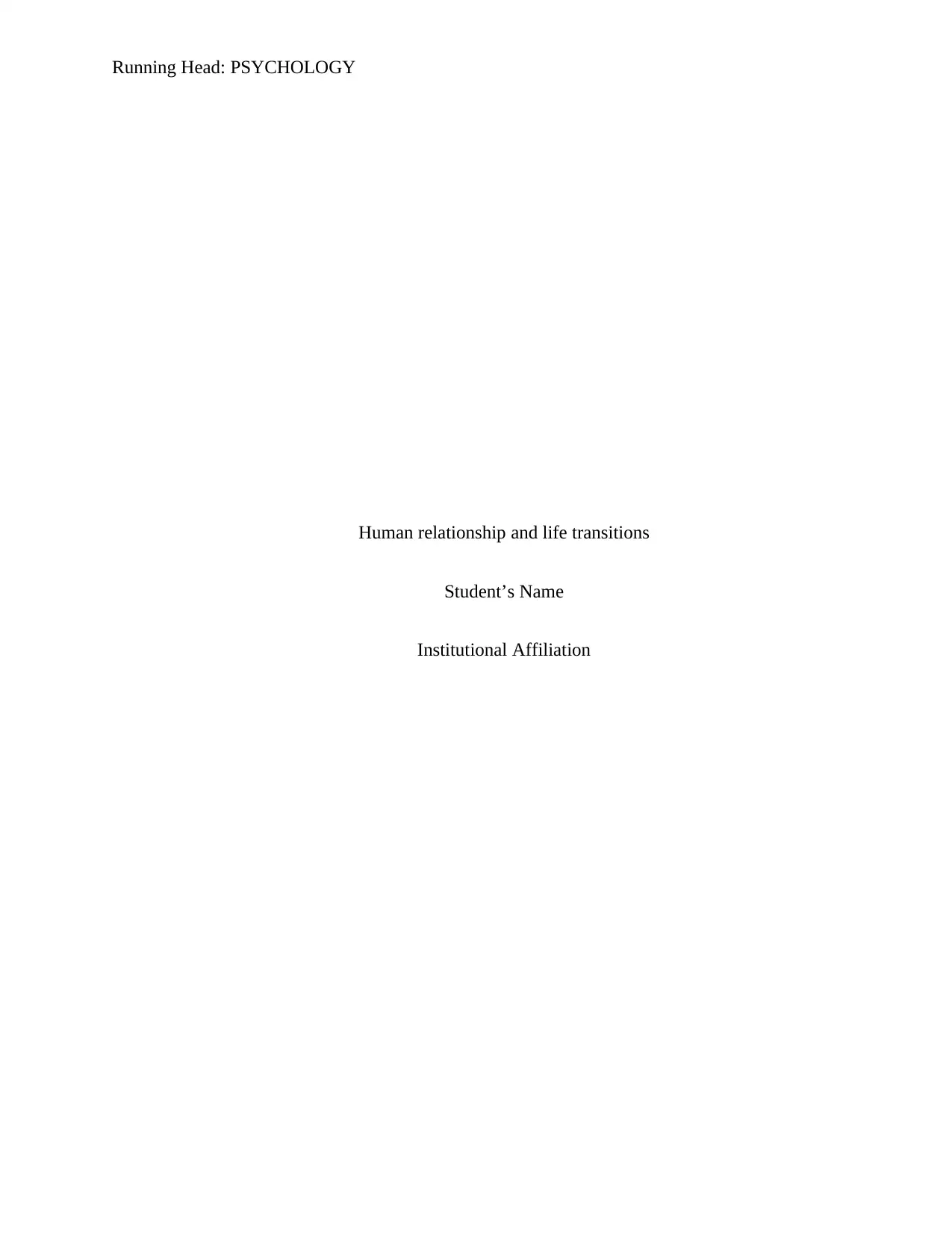
Running Head: PSYCHOLOGY
Human relationship and life transitions
Student’s Name
Institutional Affiliation
Human relationship and life transitions
Student’s Name
Institutional Affiliation
Paraphrase This Document
Need a fresh take? Get an instant paraphrase of this document with our AI Paraphraser
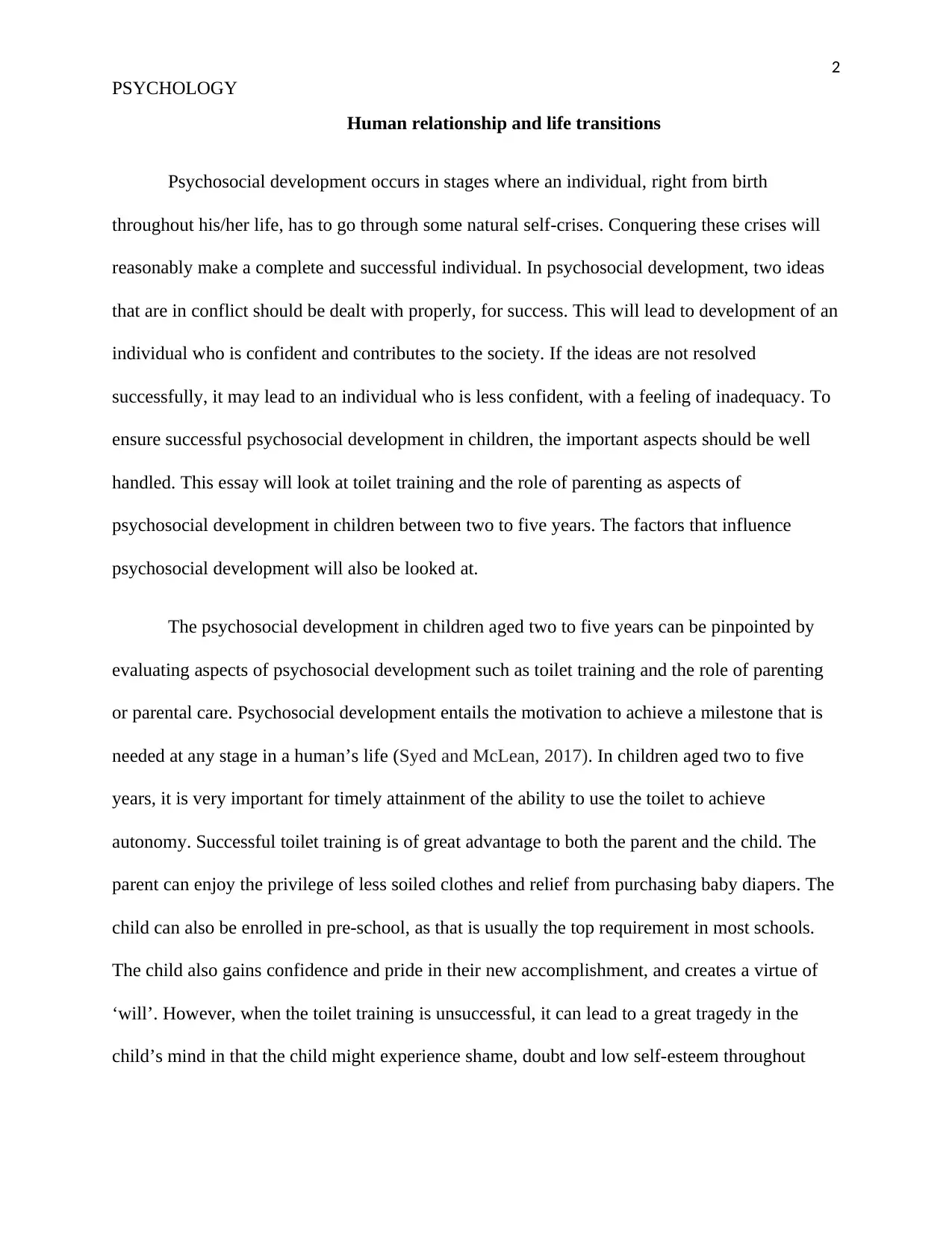
2
PSYCHOLOGY
Human relationship and life transitions
Psychosocial development occurs in stages where an individual, right from birth
throughout his/her life, has to go through some natural self-crises. Conquering these crises will
reasonably make a complete and successful individual. In psychosocial development, two ideas
that are in conflict should be dealt with properly, for success. This will lead to development of an
individual who is confident and contributes to the society. If the ideas are not resolved
successfully, it may lead to an individual who is less confident, with a feeling of inadequacy. To
ensure successful psychosocial development in children, the important aspects should be well
handled. This essay will look at toilet training and the role of parenting as aspects of
psychosocial development in children between two to five years. The factors that influence
psychosocial development will also be looked at.
The psychosocial development in children aged two to five years can be pinpointed by
evaluating aspects of psychosocial development such as toilet training and the role of parenting
or parental care. Psychosocial development entails the motivation to achieve a milestone that is
needed at any stage in a human’s life (Syed and McLean, 2017). In children aged two to five
years, it is very important for timely attainment of the ability to use the toilet to achieve
autonomy. Successful toilet training is of great advantage to both the parent and the child. The
parent can enjoy the privilege of less soiled clothes and relief from purchasing baby diapers. The
child can also be enrolled in pre-school, as that is usually the top requirement in most schools.
The child also gains confidence and pride in their new accomplishment, and creates a virtue of
‘will’. However, when the toilet training is unsuccessful, it can lead to a great tragedy in the
child’s mind in that the child might experience shame, doubt and low self-esteem throughout
PSYCHOLOGY
Human relationship and life transitions
Psychosocial development occurs in stages where an individual, right from birth
throughout his/her life, has to go through some natural self-crises. Conquering these crises will
reasonably make a complete and successful individual. In psychosocial development, two ideas
that are in conflict should be dealt with properly, for success. This will lead to development of an
individual who is confident and contributes to the society. If the ideas are not resolved
successfully, it may lead to an individual who is less confident, with a feeling of inadequacy. To
ensure successful psychosocial development in children, the important aspects should be well
handled. This essay will look at toilet training and the role of parenting as aspects of
psychosocial development in children between two to five years. The factors that influence
psychosocial development will also be looked at.
The psychosocial development in children aged two to five years can be pinpointed by
evaluating aspects of psychosocial development such as toilet training and the role of parenting
or parental care. Psychosocial development entails the motivation to achieve a milestone that is
needed at any stage in a human’s life (Syed and McLean, 2017). In children aged two to five
years, it is very important for timely attainment of the ability to use the toilet to achieve
autonomy. Successful toilet training is of great advantage to both the parent and the child. The
parent can enjoy the privilege of less soiled clothes and relief from purchasing baby diapers. The
child can also be enrolled in pre-school, as that is usually the top requirement in most schools.
The child also gains confidence and pride in their new accomplishment, and creates a virtue of
‘will’. However, when the toilet training is unsuccessful, it can lead to a great tragedy in the
child’s mind in that the child might experience shame, doubt and low self-esteem throughout
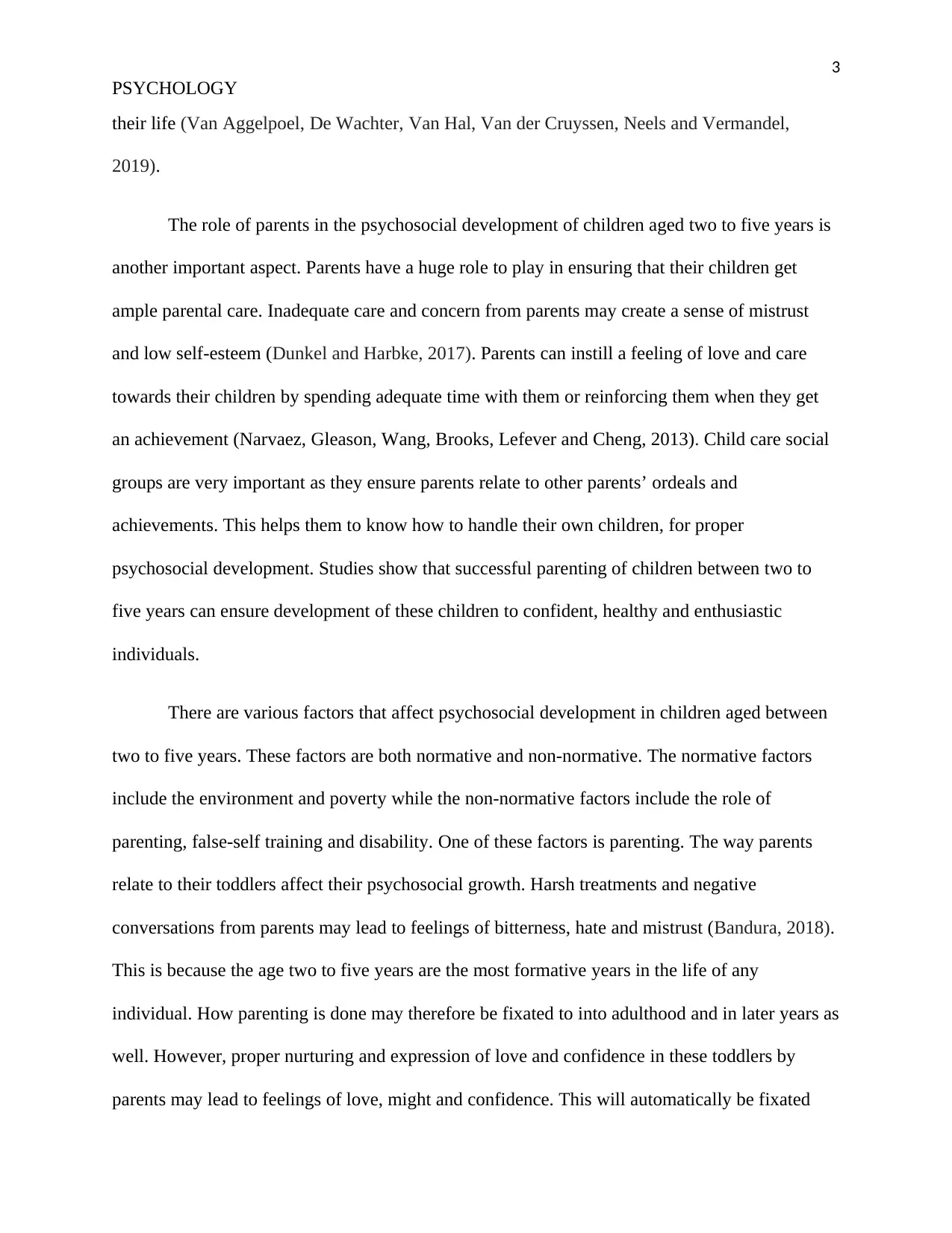
3
PSYCHOLOGY
their life (Van Aggelpoel, De Wachter, Van Hal, Van der Cruyssen, Neels and Vermandel,
2019).
The role of parents in the psychosocial development of children aged two to five years is
another important aspect. Parents have a huge role to play in ensuring that their children get
ample parental care. Inadequate care and concern from parents may create a sense of mistrust
and low self-esteem (Dunkel and Harbke, 2017). Parents can instill a feeling of love and care
towards their children by spending adequate time with them or reinforcing them when they get
an achievement (Narvaez, Gleason, Wang, Brooks, Lefever and Cheng, 2013). Child care social
groups are very important as they ensure parents relate to other parents’ ordeals and
achievements. This helps them to know how to handle their own children, for proper
psychosocial development. Studies show that successful parenting of children between two to
five years can ensure development of these children to confident, healthy and enthusiastic
individuals.
There are various factors that affect psychosocial development in children aged between
two to five years. These factors are both normative and non-normative. The normative factors
include the environment and poverty while the non-normative factors include the role of
parenting, false-self training and disability. One of these factors is parenting. The way parents
relate to their toddlers affect their psychosocial growth. Harsh treatments and negative
conversations from parents may lead to feelings of bitterness, hate and mistrust (Bandura, 2018).
This is because the age two to five years are the most formative years in the life of any
individual. How parenting is done may therefore be fixated to into adulthood and in later years as
well. However, proper nurturing and expression of love and confidence in these toddlers by
parents may lead to feelings of love, might and confidence. This will automatically be fixated
PSYCHOLOGY
their life (Van Aggelpoel, De Wachter, Van Hal, Van der Cruyssen, Neels and Vermandel,
2019).
The role of parents in the psychosocial development of children aged two to five years is
another important aspect. Parents have a huge role to play in ensuring that their children get
ample parental care. Inadequate care and concern from parents may create a sense of mistrust
and low self-esteem (Dunkel and Harbke, 2017). Parents can instill a feeling of love and care
towards their children by spending adequate time with them or reinforcing them when they get
an achievement (Narvaez, Gleason, Wang, Brooks, Lefever and Cheng, 2013). Child care social
groups are very important as they ensure parents relate to other parents’ ordeals and
achievements. This helps them to know how to handle their own children, for proper
psychosocial development. Studies show that successful parenting of children between two to
five years can ensure development of these children to confident, healthy and enthusiastic
individuals.
There are various factors that affect psychosocial development in children aged between
two to five years. These factors are both normative and non-normative. The normative factors
include the environment and poverty while the non-normative factors include the role of
parenting, false-self training and disability. One of these factors is parenting. The way parents
relate to their toddlers affect their psychosocial growth. Harsh treatments and negative
conversations from parents may lead to feelings of bitterness, hate and mistrust (Bandura, 2018).
This is because the age two to five years are the most formative years in the life of any
individual. How parenting is done may therefore be fixated to into adulthood and in later years as
well. However, proper nurturing and expression of love and confidence in these toddlers by
parents may lead to feelings of love, might and confidence. This will automatically be fixated
⊘ This is a preview!⊘
Do you want full access?
Subscribe today to unlock all pages.

Trusted by 1+ million students worldwide
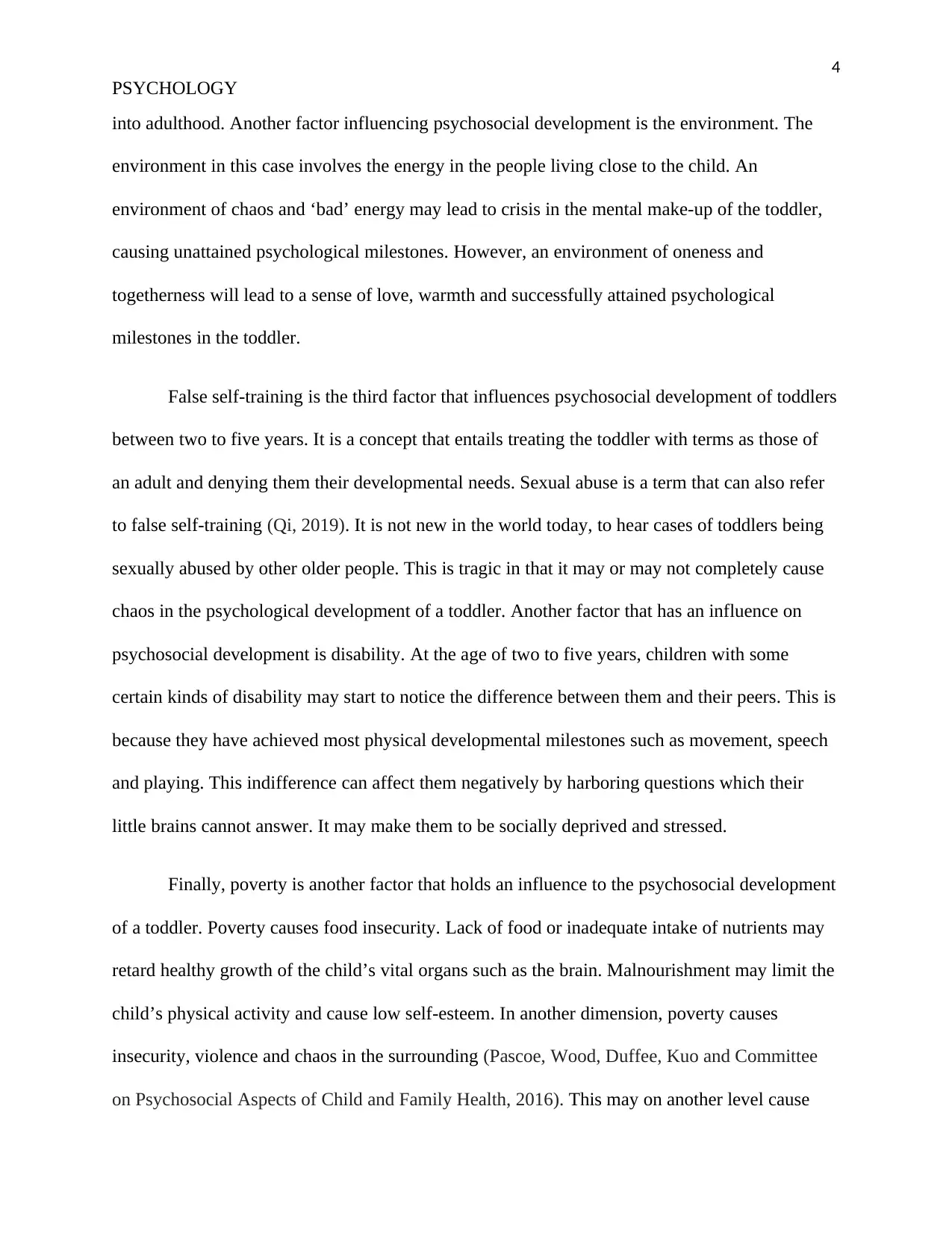
4
PSYCHOLOGY
into adulthood. Another factor influencing psychosocial development is the environment. The
environment in this case involves the energy in the people living close to the child. An
environment of chaos and ‘bad’ energy may lead to crisis in the mental make-up of the toddler,
causing unattained psychological milestones. However, an environment of oneness and
togetherness will lead to a sense of love, warmth and successfully attained psychological
milestones in the toddler.
False self-training is the third factor that influences psychosocial development of toddlers
between two to five years. It is a concept that entails treating the toddler with terms as those of
an adult and denying them their developmental needs. Sexual abuse is a term that can also refer
to false self-training (Qi, 2019). It is not new in the world today, to hear cases of toddlers being
sexually abused by other older people. This is tragic in that it may or may not completely cause
chaos in the psychological development of a toddler. Another factor that has an influence on
psychosocial development is disability. At the age of two to five years, children with some
certain kinds of disability may start to notice the difference between them and their peers. This is
because they have achieved most physical developmental milestones such as movement, speech
and playing. This indifference can affect them negatively by harboring questions which their
little brains cannot answer. It may make them to be socially deprived and stressed.
Finally, poverty is another factor that holds an influence to the psychosocial development
of a toddler. Poverty causes food insecurity. Lack of food or inadequate intake of nutrients may
retard healthy growth of the child’s vital organs such as the brain. Malnourishment may limit the
child’s physical activity and cause low self-esteem. In another dimension, poverty causes
insecurity, violence and chaos in the surrounding (Pascoe, Wood, Duffee, Kuo and Committee
on Psychosocial Aspects of Child and Family Health, 2016). This may on another level cause
PSYCHOLOGY
into adulthood. Another factor influencing psychosocial development is the environment. The
environment in this case involves the energy in the people living close to the child. An
environment of chaos and ‘bad’ energy may lead to crisis in the mental make-up of the toddler,
causing unattained psychological milestones. However, an environment of oneness and
togetherness will lead to a sense of love, warmth and successfully attained psychological
milestones in the toddler.
False self-training is the third factor that influences psychosocial development of toddlers
between two to five years. It is a concept that entails treating the toddler with terms as those of
an adult and denying them their developmental needs. Sexual abuse is a term that can also refer
to false self-training (Qi, 2019). It is not new in the world today, to hear cases of toddlers being
sexually abused by other older people. This is tragic in that it may or may not completely cause
chaos in the psychological development of a toddler. Another factor that has an influence on
psychosocial development is disability. At the age of two to five years, children with some
certain kinds of disability may start to notice the difference between them and their peers. This is
because they have achieved most physical developmental milestones such as movement, speech
and playing. This indifference can affect them negatively by harboring questions which their
little brains cannot answer. It may make them to be socially deprived and stressed.
Finally, poverty is another factor that holds an influence to the psychosocial development
of a toddler. Poverty causes food insecurity. Lack of food or inadequate intake of nutrients may
retard healthy growth of the child’s vital organs such as the brain. Malnourishment may limit the
child’s physical activity and cause low self-esteem. In another dimension, poverty causes
insecurity, violence and chaos in the surrounding (Pascoe, Wood, Duffee, Kuo and Committee
on Psychosocial Aspects of Child and Family Health, 2016). This may on another level cause
Paraphrase This Document
Need a fresh take? Get an instant paraphrase of this document with our AI Paraphraser
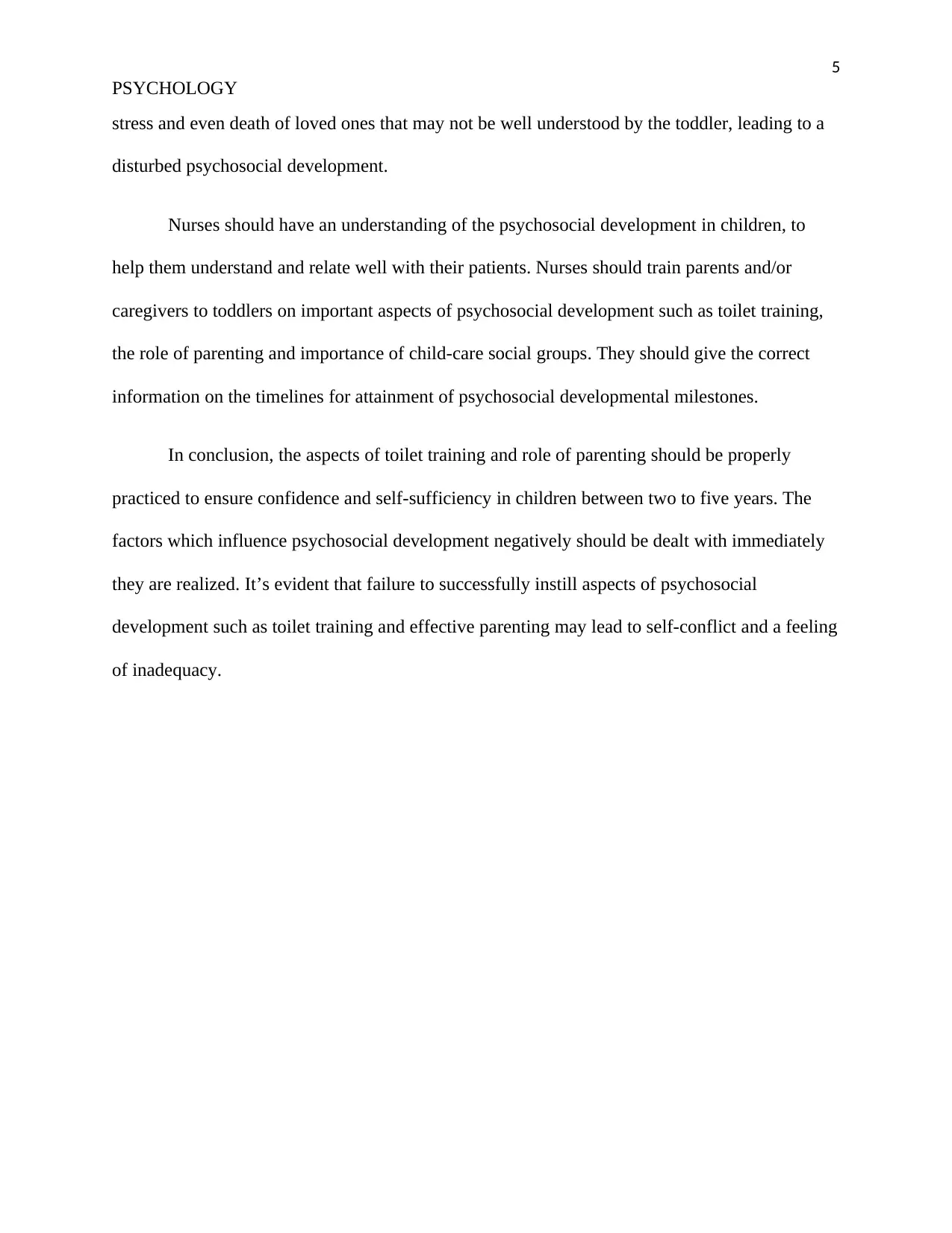
5
PSYCHOLOGY
stress and even death of loved ones that may not be well understood by the toddler, leading to a
disturbed psychosocial development.
Nurses should have an understanding of the psychosocial development in children, to
help them understand and relate well with their patients. Nurses should train parents and/or
caregivers to toddlers on important aspects of psychosocial development such as toilet training,
the role of parenting and importance of child-care social groups. They should give the correct
information on the timelines for attainment of psychosocial developmental milestones.
In conclusion, the aspects of toilet training and role of parenting should be properly
practiced to ensure confidence and self-sufficiency in children between two to five years. The
factors which influence psychosocial development negatively should be dealt with immediately
they are realized. It’s evident that failure to successfully instill aspects of psychosocial
development such as toilet training and effective parenting may lead to self-conflict and a feeling
of inadequacy.
PSYCHOLOGY
stress and even death of loved ones that may not be well understood by the toddler, leading to a
disturbed psychosocial development.
Nurses should have an understanding of the psychosocial development in children, to
help them understand and relate well with their patients. Nurses should train parents and/or
caregivers to toddlers on important aspects of psychosocial development such as toilet training,
the role of parenting and importance of child-care social groups. They should give the correct
information on the timelines for attainment of psychosocial developmental milestones.
In conclusion, the aspects of toilet training and role of parenting should be properly
practiced to ensure confidence and self-sufficiency in children between two to five years. The
factors which influence psychosocial development negatively should be dealt with immediately
they are realized. It’s evident that failure to successfully instill aspects of psychosocial
development such as toilet training and effective parenting may lead to self-conflict and a feeling
of inadequacy.
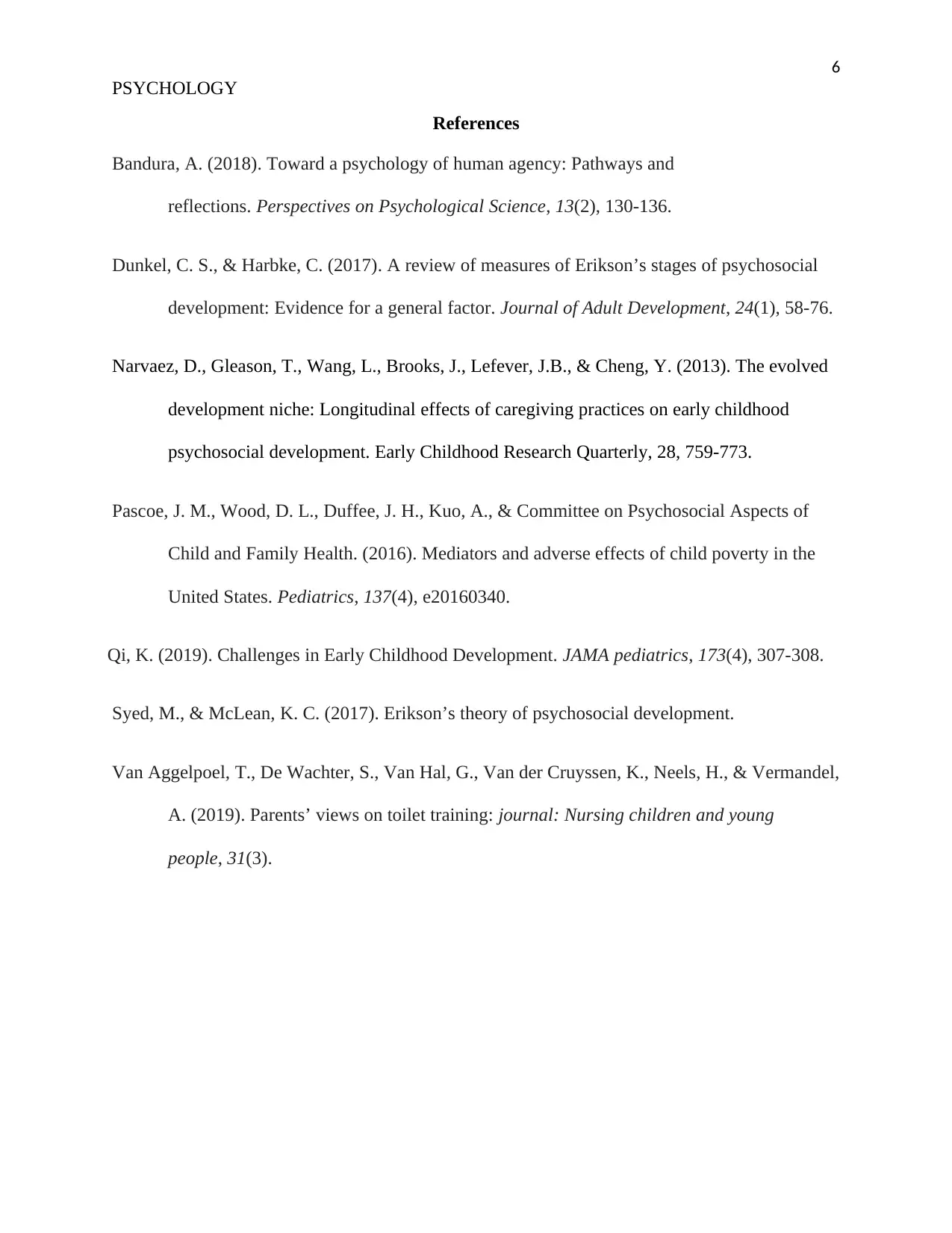
6
PSYCHOLOGY
References
Bandura, A. (2018). Toward a psychology of human agency: Pathways and
reflections. Perspectives on Psychological Science, 13(2), 130-136.
Dunkel, C. S., & Harbke, C. (2017). A review of measures of Erikson’s stages of psychosocial
development: Evidence for a general factor. Journal of Adult Development, 24(1), 58-76.
Narvaez, D., Gleason, T., Wang, L., Brooks, J., Lefever, J.B., & Cheng, Y. (2013). The evolved
development niche: Longitudinal effects of caregiving practices on early childhood
psychosocial development. Early Childhood Research Quarterly, 28, 759-773.
Pascoe, J. M., Wood, D. L., Duffee, J. H., Kuo, A., & Committee on Psychosocial Aspects of
Child and Family Health. (2016). Mediators and adverse effects of child poverty in the
United States. Pediatrics, 137(4), e20160340.
Qi, K. (2019). Challenges in Early Childhood Development. JAMA pediatrics, 173(4), 307-308.
Syed, M., & McLean, K. C. (2017). Erikson’s theory of psychosocial development.
Van Aggelpoel, T., De Wachter, S., Van Hal, G., Van der Cruyssen, K., Neels, H., & Vermandel,
A. (2019). Parents’ views on toilet training: journal: Nursing children and young
people, 31(3).
PSYCHOLOGY
References
Bandura, A. (2018). Toward a psychology of human agency: Pathways and
reflections. Perspectives on Psychological Science, 13(2), 130-136.
Dunkel, C. S., & Harbke, C. (2017). A review of measures of Erikson’s stages of psychosocial
development: Evidence for a general factor. Journal of Adult Development, 24(1), 58-76.
Narvaez, D., Gleason, T., Wang, L., Brooks, J., Lefever, J.B., & Cheng, Y. (2013). The evolved
development niche: Longitudinal effects of caregiving practices on early childhood
psychosocial development. Early Childhood Research Quarterly, 28, 759-773.
Pascoe, J. M., Wood, D. L., Duffee, J. H., Kuo, A., & Committee on Psychosocial Aspects of
Child and Family Health. (2016). Mediators and adverse effects of child poverty in the
United States. Pediatrics, 137(4), e20160340.
Qi, K. (2019). Challenges in Early Childhood Development. JAMA pediatrics, 173(4), 307-308.
Syed, M., & McLean, K. C. (2017). Erikson’s theory of psychosocial development.
Van Aggelpoel, T., De Wachter, S., Van Hal, G., Van der Cruyssen, K., Neels, H., & Vermandel,
A. (2019). Parents’ views on toilet training: journal: Nursing children and young
people, 31(3).
⊘ This is a preview!⊘
Do you want full access?
Subscribe today to unlock all pages.

Trusted by 1+ million students worldwide
1 out of 6
Related Documents
Your All-in-One AI-Powered Toolkit for Academic Success.
+13062052269
info@desklib.com
Available 24*7 on WhatsApp / Email
![[object Object]](/_next/static/media/star-bottom.7253800d.svg)
Unlock your academic potential
Copyright © 2020–2026 A2Z Services. All Rights Reserved. Developed and managed by ZUCOL.




